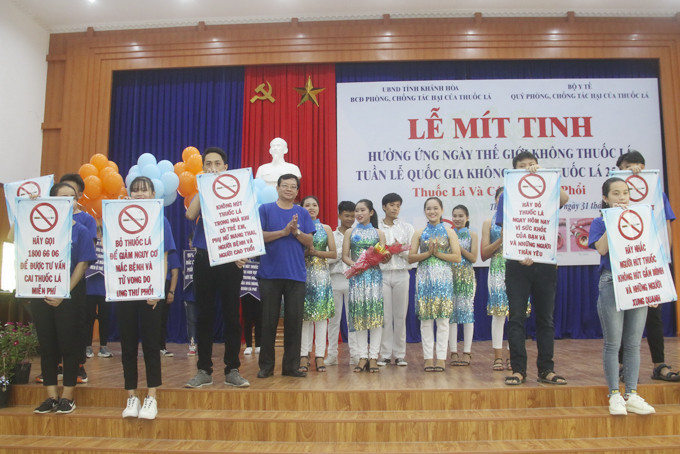
The common goal of the National Tobacco Control Strategy is to reduce tobacco use in an effort to gradually decrease the supply of tobacco products consumed in Vietnam, contributing to lowering the risks of smoking-related illness and deaths...
The common goal of the National Tobacco Control Strategy is to reduce tobacco use in an effort to gradually decrease the supply of tobacco products consumed in Vietnam, contributing to lowering the risks of smoking-related illness and deaths.
Nearly 1 billion people around the world light up cigarettes; tobacco kills more than nearly 6 million people, including more than 5 million smokers and 600,000 others exposed to passive smoking each year. Smoking causes 25 disease, including fatal lung cancer, stroke, chronic obstructive pulmonary disease, etc. Vietnam is listed among 15 nations with the most smokers, half of whom are male adults. As many as 40 000 people in Vietnam die each year from tobacco-related diseases. 96.8% of patients with lung cancer smoke.

|
On August 16, 2012, the National Assembly Standing Committee approved the Tobacco Control Law to reduce tobacco use, promote tobacco supply and assure conditions for tobacco control. Dr. Ton That Toan, Deputy Director of Khanh Hoa Provincial Center for Disease Control, tobacco control requires interdisciplinary cooperation from the manufacturing to consumption within the management scopes of many sectors such as Agriculture and Rural Development; Industry and Trade, Planning and Investment; Health Care, Education and Training; Information and Communication; Culture - Sports and Tourism and many other agencies, organizations and associations.
Every year, the People's Committees of provinces and cities issue documents to direct and increase public awareness and implementation of the Tobacco Control Law among departments, agencies, mass organizations, People's Committees of districts and towns. The content of the direction follows the instructions of central agencies. Some provinces have directed departments, agencies and sectors to coordinate in inspecting and controlling the tobacco market, promptly detecting and handling administrative violations in trading of smuggled and fake tobacco products.
Many provinces have set up inspection teams to supervise the implementation of the Tobacco Control Law at agencies, organizations, restaurants and hotels every year, contributing to heightening the law to all people, cadres and civil servants.
According to the Ministry of Health’s proposal, the People’s Committees of provinces and cities are required to preside over and build regulations for interdisciplinary cooperation of State management agencies in tobacco control, especially tacking related violations; assign specific tasks and responsibilities for the implementation of the law on handling administrative violations. Departments, agencies, organizations and localities need to provide consultancy for the Provincial People's Committee and the Steering Committee for Tobacco Control to issue guidance documents in the province to strictly implement the Tobacco Control Law.
Based on the annual plan of the province, departments, agencies, the People's Committees of districts and towns shall issue plans to implement the Tobacco Control Law activities; ensure enforcement of smoke-free regulations in hospitals, schools and on public transport vehicles; expand local addiction cessation counseling network, especially at all hospitals and medical centers; and invest in facilities, equipment and funds for smoking cessation counseling and treatment.
Q.L
Translated by N.T






